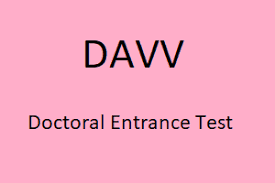DET on Oct 31, registration to begin from Sept 8
Kenfra Research2023-09-15T16:32:18+05:30Doctoral Entrance test on Oct 31, registration to begin from Sept 8
A Doctoral Entrance Test is an examination or assessment that individuals typically take to gain admission to a doctoral (Ph.D.) program at a university or educational institution. The test evaluates a candidate’s readiness and qualifications for pursuing advanced research and academic work at the doctoral level. Here are some key points about Doctoral Entrance Tests.
Purpose: The primary purpose of a Doctoral Entrance Test is to assess a candidate’s academic knowledge, research aptitude, and potential to contribute to their chosen field of study at the doctoral level.
Content: The content and format of the test can vary significantly depending on the university or institution offering the doctoral program. Some tests may focus on subject-specific knowledge, while others may include research proposals, interviews, or other assessment components.
Eligibility: Candidates interested in taking a DET should meet the eligibility criteria specified by the university or institution offering the doctoral program. Eligibility criteria often include a minimum level of educational qualifications and prerequisites.
Application Process: To register for a DET, candidates typically need to complete an application process through the university’s admissions department. This process usually includes submitting an application form, academic transcripts, letters of recommendation, and any other required documentation.
Test Dates: DETs are administered on specific dates, which are usually announced by the university or institution well in advance. Candidates need to check the official website or contact the university for information about test dates.

6. Test Format: The format of the Doctoral Entrance Test can vary. Some universities use standardized tests, such as the GRE (Graduate Record Examination) or subject-specific GRE tests, while others create their own customized tests or assessments.
7. Scoring: Scoring methods can also vary. Some universities may use a cutoff score for admission, while others consider a candidate’s overall application, including test scores, academic records, and recommendations.
8. Interviews and Research Proposals: In addition to written tests, some programs may require candidates to undergo interviews and submit research proposals as part of the admission process. These elements help assess a candidate’s research interests and potential.
9. Preparation: Preparing for a DET typically involves reviewing relevant academic material, studying for subject-specific portions (if applicable), and practicing writing research proposals or essays.
10. Admission: The admission decision is typically made based on a combination of factors, including the results of the DET, academic records, letters of recommendation, and interviews. Candidates who are successful in the admission process are granted entry into the doctoral program.
Doctoral Entrance test on Oct 31, registration to begin from Sept 8
The specific information about the Doctoral Entrance Test (DET) date and registration timeline.
- DET Date: The Doctoral Entrance Test is scheduled for October 31st.
- Registration Start Date: Registration for the DET is set to begin on September 8th.
Doctoral Entrance test registration process:
The registration process for a Doctoral Entrance Test (DET) can vary depending on the specific institution or university that is conducting the test.
Check Eligibility: Before you begin the registration process, make sure you meet the eligibility criteria for the doctoral program and entrance test. These criteria may include educational qualifications, minimum GPA requirements, and other prerequisites.
Select the Test and Institution: Determine which doctoral entrance test you need to take and identify the institution or university where you want to pursue your Ph.D. This information should be available on the institution’s website or in the admission brochure.
Collect Required Documents: Gather all the necessary documents, which typically include transcripts, letters of recommendation, a statement of purpose, and any other documents specified by the institution. You may need to upload these documents during the registration process.
Online Registration: Most institutions offer online registration for doctoral entrance tests. Visit the official website of the institution and navigate to the admissions or entrance test section. Look for the registration link and click on it.
Fill Out the Application Form: Complete the online application form with accurate and up-to-date information. You’ll need to provide personal details, educational history, and contact information. Be prepared to upload scanned copies of your documents if required.
Pay the Application Fee: Pay the application fee using the online payment methods specified by the institution. The fee amount can vary from one institution to another.
Choose Test Center and Date: If the DET offers multiple test centers and dates, select your preferred options during the registration process. Some tests may have fixed test centers and dates.
Review and Submit: Review your application form for accuracy and completeness. Make any necessary corrections before submitting it.
Receive Confirmation: After successfully submitting your application, you should receive a confirmation email or notification. This may include details about your test date, venue, and any additional instructions.
Prepare for the Test: Use the time leading up to the test date to prepare thoroughly. Study the test syllabus, practice sample questions if available, and make sure you have all necessary identification documents for the test day.
Take the Test: On the scheduled test date, arrive at the test center on time with the required identification and admission ticket. Follow all test center rules and guidelines.
Receive Test Results: After taking the test, you will typically receive your results within a specified timeframe. These results will help determine whether you meet the criteria for admission to the doctoral program.







Leave a Reply